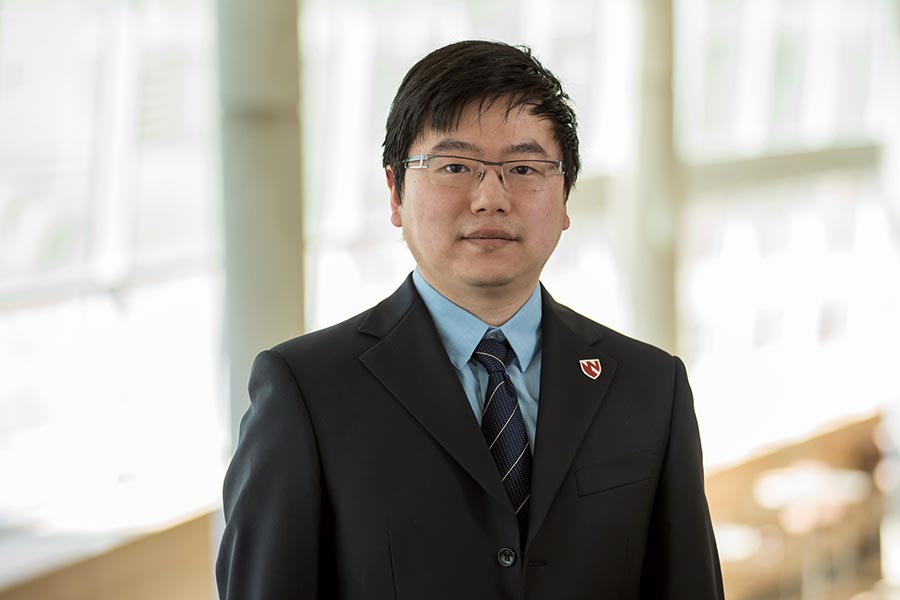Zhao Lab
The Zhao lab aims to develop innovative electrical engineering approaches and technologies to facilitate the diagnosis and treatment of human diseases. Our current research is focused on four aspects: 1) to develop biologically matched, ion current-based electrical stimulation systems that can safely and effectively apply high-intensity, therapeutic electrical currents to human tissues with high spatial resolution; 2) based on our ion current electrical stimulation system, we are developing localized and highly efficient intraocular and transdermal iontophoretic drug delivery systems; 3) we are developing novel electrical stimulation systems for efficacious rehabilitation of muscles and nerves after peripheral nerve injuries; and 4) we are also developing novel electrical stimulation technologies that can significantly accelerate the healing of chronic wounds. We use finite-element computer simulation, laser micromachining, fast prototyping, in vitro cell cultures, ex vivo tissue models and in vivo animal models in the development and testing of our technologies.
Siwei Zhao, PhD, Principal Investigator
Dr. Siwei Zhao conducted his PhD study in biomedical engineering at the University of California, Davis. His doctoral research was mainly focused on the development of novel and unconventional fabrication techniques for microfluidics and lab-on-a-chip devices. He has applied these devices to both basic biomedical studies and translational research, including using high throughput lab-on-a-chip devices to study cellular response to electrical stimulation and using microfluidic systems to synthesize and screen large random peptide libraries for cancer-specific ligands.
He then joined Prof. David Kaplan’s group as a postdoctoral research associate at Tufts University. In Kaplan lab, his research centered on the development of hydrogel biomaterial-based engineering systems with improved biological interface. A silk hydrogel microfluidic scaffold was developed for long-term, 3D tissue culture and the results were published in Biomaterials. At the same time, he utilized hydrogel materials to redesign electrical circuits. A new hydrogel-based circuit system, capable of conducting ion currents, was developed. This hydrogel ionic circuit was mechanically compliant and was able to deliver electrical stimulation to biological tissues. The results were reported in Advanced Materials.
In March 2019, he became an assistant professor at UNMC. He is a part of the Holland Regenerative Medicine Program. He is highly motivated to pursue an interdisciplinary research career at the interface of the life sciences and engineering. His current research interests include developing truly biologically matched electrical systems to significantly improve the efficacy and safety of electrical stimulation-based therapies for wound healing, nerve regeneration, pain management and drug delivery.
Lab Members
- Fan Zhao, PhD, postdoc associate
- Junying Wang, PhD, postdoc associate
- Neal C. Weldon, first year medical student research intern
- Zoey Bieranowski, high school student research intern
- Jawad Haider, high school student research intern
Patents and Patent Applications
- U.S. Patent App. 18/493,925 “Systems and methods for treating and inhibiting wound infections”
- U.S. Patent App. 18/006,116 “Hydrogel Ionic Circuit Based Devices for Electrical Stimulation and Drug Therapy”
- U.S. Provisional Patent App. 63/192,170 “Hydrogel Ionic Circuit-based Electrical Stimulation System”
- U.S. Patent App. 17/607,620 “Systems and methods for living silk articles”
- U.S. Patent App. 16/153,759 “Programmable Hydrogel Ionic Circuits for Biologically-Matched Electronic Interfaces”
- U.S. Patent 11,298,443 “Innervated artificial skin”
Job Opportunities
We are constantly recruiting undergraduate interns, graduate students and postdoctoral associates to work on our multidisciplinary research projects. Passionate candidates with expertise and experience in biomedical device development, biomaterials, bioelectricity or cell and animal studies are welcome to apply. Candidates should have enthusiasm for scientific research and a track record of academic success.
Interested individuals please email Dr. Siwei Zhao.

Siwei Zhao, PhD
Siwei Zhao, PhD, was named a UNMC Distinguished Scientist, Research Leadership and New Investigator Award winner for 2022.
Principal Investigator
Mary and Dick Holland Regenerative Medicine Program
Department of Surgery, Division of Transplant Surgery
University of Nebraska Medical Center
985965 Nebraska Medical Center
Omaha, NE 68198-5965